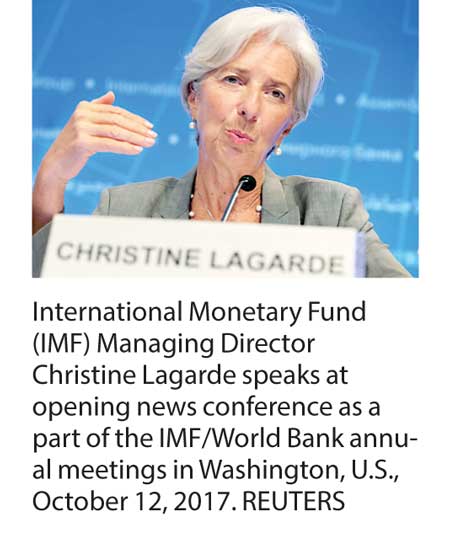Sunday Feb 15, 2026
Sunday Feb 15, 2026
Friday, 13 October 2017 00:02 - - {{hitsCtrl.values.hits}}

By Uditha Jayasinghe in Washington
Policymakers, especially in emerging markets, should use the global recovery to tackle policy challenges including reducing debt, implement structural reforms and combat corruption to increase growth, the International Monetary Fund (IMF) Managing Director Christine Lagarde said on Thursday.
The IMF earlier this week predicted global growth would be 3.6% in 2017, the most positive outlook it has delivered in the last decade. However, it also warned that recovery remains uneven across the globe and will only be complete if stronger policies were made to improve medium-term prospects, which continue to be weighed down by population aging, elevated public and private debt levels, high economic and policy uncertainty and weak governance.
“Nearly 75% of the world is seeing an upswing and is the broadest-based recovery in the last 10 years and this is driven by trade, investment and consumption. It is shared between the emerging markets, which are providing about 80% of growth, but also with other countries such as Europe, the US and Japan. What has not changed is that the recovery is not complete. Over 40 countries recorded negative growth last year,” Lagarde told reporters.
Speaking ahead of a meeting of finance ministers and central bank governors, the Managing Director was clear that policymakers have even more work ahead of them in accomplishing wide-ranging reforms that would provide sustainable growth locally, regionally and globally.
“The best time to fix the roof is when the sun is shining. It is not the time to be complacent….the recovery should be made sustainable,” she said.
The welcome upturn in global activity provides a window of opportunity to tackle key policy challenges and stave off downside risks, including by ensuring appropriate buffers, and to maximise returns on structural reforms to raise potential output, she emphasised.
Higher cyclical growth increases the effectiveness of structural reforms, such as product market liberalisation, job protection and unemployment benefits, and provides room to manage the challenges from technology and integration. Implement policies that raise labour force participation and productivity growth.
Removing barriers will include fighting corruption, financial regulatory reform, climate challenges and fostering corporation on issues that cut across borders. Sri Lanka, which is possibly easing out of a cycle of tightened monetary policy, also has significant challenges of reforms ahead, particularly in reforming loss-making state-owned enterprises, targeting inflation, increasing public revenue, promoting better debt management and fostering investment.
The IMF Managing Director also highlighted the human factor in the Brexit decision-making process saying the European Union and the UK should prioritise the matter of people - those EU nationals living in the UK and vice versa - above all else.
“[It’s a] situation of people first [and] business second.” she said.
Lagarde’s comments come as Brexit talks between the UK and the EU appeared be deadlocked, raising the possibility that Britain could crash out of the union with no new trade deal in place.
A clearer timetable and plan for UK negotiations with Brussels was essential, Lagarde argued, adding that “our [the IMF’s] hope is that it be conducted promptly.”
The EU is Sri Lanka’s largest export market accounting for more than a quarter of all exports, particularly for apparel.